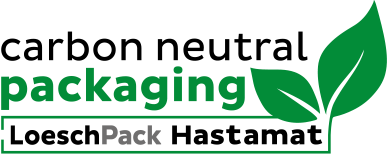Goal 3: Good health and well-being for people
Goal 6: Clean water and sanitation
Goal 7: Affordable and clean energy
Goal 8: Decent work and economic growth
Goal 9: Industry, Innovation and Infrastructure
Goal 10: Reducing inequalities
Goal 11: Sustainable cities and communities
Goal 12: Responsible consumption and production
Goal 16: Peace, justice and strong institutions
Goal 17: Partnerships for the goals
Sustainable Development Goals
Our entire sustainability commitment is based on the Sustainable Development Goals (SDG). These are 17 goals defined by the United Nations and they are intended to ensure sustainable development worldwide on an ecological, social and economic level. The goals are non-divisible and necessitate one another. They are preceded as key messages by the so-called "5 Ps": People, Planet, Prosperity, Peace and Partnership.
The goals are a major constituent part of Agenda 2030, which was enacted in September 2015 at a United Nations summit attended by the member states. This is intended to enable life that worthy of human beings worldwide while simultaneously preserving the natural basis of life. The SDG came into force in January 2016 and apply for 15 years until the end of 2030. All nations in the world – whether developing and emerging or industrial nations – are to align their actions and conduct to these goals.
Goal 1: No poverty
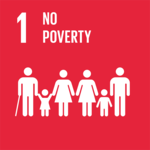
"End poverty in any form and everywhere"
Ending poverty is a higher-level goal of international policy for sustainable development. Poverty is one of the greatest challenges of modern times. It manifests itself not only in financial resources, but also in education, healthcare, living circumstances or possibilities for social and political involvement. Although the proportion of people living in extreme poverty was reduced from 60% in the year 1970 to 10% in the year 2015, more than 736 million people were still living in extreme poverty in that year. The fact that the world is politically and economically interconnected means that the effects of poverty are felt worldwide and it affects the whole of society. In order to end poverty in the long term worldwide, all human beings require equal access to work, high-quality education and healthcare. They must be able to live in peace and security and trust that their rights will be respected. SDG 1 is intended to make a contribution to this.
Goal 2: Zero hunger
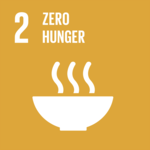
"End hunger, achieve food security and improved nutrition, and promote sustainable agriculture"
Approximately two billion people do not have enough to eat or are unable to vary their nutrition. The main cause of this is poverty. People do not have enough money to buy food. To achieve a world without hunger, the promotion of sustainable agriculture, the development of rural regions and specific food programmes are important instruments. They create employment and income and can ensure people are fed over the long term. By 2030, no human being should suffer from hunger, malnutrition or any other type of malnourishment.
Goal 3: Good health and well-being for people
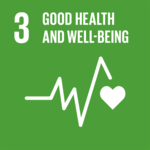
"Ensure a healthy life for people of all ages and to promote their well-being"
The challenges in the area of health are extensive. It is still the case that 16,000 children die every day, many from diseases that could be treated and avoided. It is therefore one of the most important tasks to improve the health situation of human beings. This is the aim, the requirement and the result of sustainable development. Promoting health is a human imperative and a constituent part of responsible government – for both industrial and developing countries. SDG 3 intends to improve health by strengthening healthcare systems, medical research and international co-operation.
Goal 4: Quality education
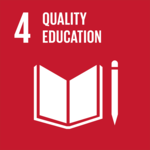
"Ensure inclusive and equitable quality education and promote lifelong learning opportunities for all"
Education is a human right – every human being has the right to school education and every human being has the right to satisfy their learning needs throughout their life. Education is the key to individual opportunity and development with a future. Education enables people to improve their political, social, cultural and economic situation. Measures to achieve SDG 4 and inclusive, high-quality education with equal opportunities are the duty to provide pre-school education free of charge, 12 years of primary and secondary school, as well as courses of study, further training and learning possibilities in the internet.
Goal 5: Gender equality
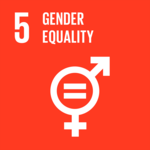
"Achieve gender equality and empower all women and girls"
Gender equality is a major factor for sustainable development and a universal human right. However, millions of women worldwide are discriminated against as regards access to education or healthcare and in their everyday lives. They are still too frequently victims of human trafficking as well as physical and sexual violence. For example, 19% of all girls and women worldwide experienced physical violence at the hands of their partner last year. In 49 countries, there are not yet any laws that punish or even prosecute this form of violence. Moreover, 15 million girls of primary school age – and thus 50% more girls than boys – never get the opportunity to learn to read and write. SDG 5 is intended to drive gender equality forwards and to support women and girls.
Goal 6: Clean water and sanitation
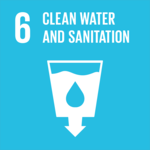
"Ensure the availability and sustainable management of water and sanitation for all"
Around 10% of human beings worldwide have no access to clean drinking water and approximately 32% of the world's population have no appropriate basic sanitation. Population growth, urbanisation, environmental pollution and climate change also increase the pressure on worldwide water resources and the ecosystems of bodies of water. All life on earth depends on water. Water is our most important foodstuff; we also need it in the household, in agriculture as well as in industry. This makes water and sanitation an important SDG as they are fundamental requirements for sustainable development all over the world.
Goal 7: Affordable and clean energy
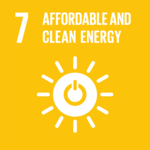
"Ensure access to affordable, reliable, sustainable and modern energy for all"
Economic and social development require energy. To reduce poverty, the energy supply in developing countries must be set up and expanded. It is currently the case that almost a billion people have no access to a modern energy supply. Most of the energy generated worldwide still comes from fossil energy sources. At the same time, however, climate change must be stopped and the burden on the environment reduced. Here, clean sources of energy as well as efficient management of resources are key factors for environmental and climate protection and the basis for a sustainable economic system. This is to be promoted with SDG 7.
Goal 8: Decent work and economic growth
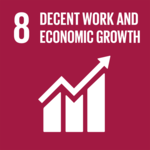
"Promote sustained, inclusive and sustainable economic growth, full and productive employment and decent work for all"
Globalisation offers many opportunities for more prosperity in the world. Not all, however, profit from the advantages of globalisation to an equal extent. In a worldwide comparison, for example, there are still great differences as far as decent work, adequate wages or compliance with minimum social standards are concerned. In order to ensure sustainable and inclusive economic growth, a sufficient number of jobs and humane working conditions are a requirement. This is to be achieved with SDG 8.
Goal 9: Industry, Innovation and Infrastructure
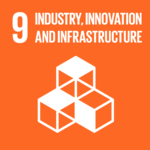
"Build resilient infrastructure, promote inclusive and sustainable industrialisation, and foster innovation"
In many rural regions in developing countries, inadequate transport routes and means of transport inhibit economic development. Transport is difficult and expensive. Deficiencies in the energy supply also have a negative effect on the performance capability of the economy. Intelligent innovations, modern infrastructures and productive industry are essential in order to achieve sustainable objectives such as sustainable economic growth, sustainable production and cities, as well as sustainable education and healthcare systems. Factors such as health, air purity or the protection of natural resources, for example, must be taken into account during the planning of infrastructure. In industry, production processes must be climate-friendly, designed for low pollution and the efficient use of resources. Innovations should also support a sustainable economy, climate and resource preservation or the energy turnaround. This is the aim of SDG 9.
Goal 10: Reducing inequalities
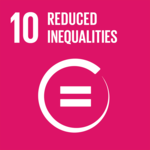
"Reduce income inequality within and among countries"
One of the greatest challenges and causes of migration these days is the growing social, political and economic inequality within and between different nations. Income and wealth are distributed unequally worldwide. In many countries, this inequality is also increasing. SDG 10 aims to reduce inequality to promote economic growth and innovative capability, to strengthen social cohesion in society, as well as to lower the migration potential. In particular, the income of the poorest 40% of the population is to grow.
Goal 11: Sustainable cities and communities
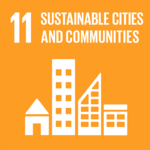
"Make cities and human settlements inclusive, safe, resilient, and sustainable"
Urbanisation is progressing worldwide – particularly in cities. More than 50% of human beings live in the urban centres of the world. By 2050, this proportion is likely to rise to 80%. In order to be able to live well in future, affordable living accommodation and sustainable as well as integrated urban development policy are required. Over and above this, cities with high quality of life feature decent work, sustainable infrastructure and mobility, as well as health and inclusion of the people. With SDG 11, nations worldwide undertook for the first time to ensure sustainable and inclusive urban development.
Goal 12: Responsible consumption and production
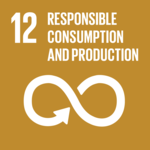
"Ensure sustainable consumption and production patterns"
In order not to exceed the natural limits of our planet, people's consumption patterns and the production techniques of companies need to change. Internationally applicable rules for health and safety and environmental protection are important here. In addition, our own private lifestyles must also be structured as more sustainable and we must consider the effects of our own behaviour. The aim is to halve food waste, handle chemicals in an environmentally compatible manner and reduce waste volume. Moreover, large companies should publish sustainability reports. The state should assume a role model function with regard to public procurement that ensures sustainable consumption and production patterns.
Goal 13: Climate action
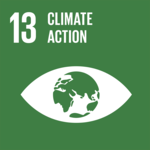
"Take urgent action to combat climate change and its impacts"
Climate change does not stop at a country's borders, rather affects the entire society. It leads to extreme weather conditions such as cyclones, droughts and flooding. Since the start of industrialisation, the mean temperature worldwide has risen on average by one degree. If greenhouse gas emissions are not limited, the earth could heat up by more than three degrees by 2100, which would involve extensive damage. With the Paris Climate Agreement and SDG 13, the international community agreed to implement measures worldwide to protect the global climate. Here, the existing interplay between politics, business and social groups must be taken into account.
Goal 14: Life below water
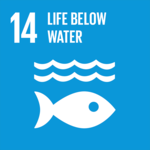
"Conserve and sustainably use the oceans, seas and marine resources for sustainable development"
The oceans from the basis of life. They cover more than 70% of our planet and are a source of food, raw materials and energy. They also serve as transport routes and are decisive for the global ecosystem. They have important climate-regulating functions. The oceans are the most important producers of oxygen worldwide and simultaneously the largest CO2 storage system. They have great biodiversity and make an important contribution to ensuring food supplies. Rising water temperatures and marine pollution, however, indicate that the oceans are in acute danger. This development is to be stopped with SDG 14, in that biodiversity is protected and used sustainably, and that the benefits are fairly shared.
Goal 15: Life on land
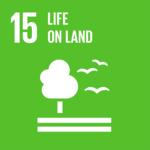
"Protect, restore and promote sustainable use of terrestrial ecosystems, sustainably manage forests, combat desertification, and halt and reverse land degradation and halt biodiversity loss"
Intact ecosystems form the basis for life on earth and sustainable development. They ensure diverse nutrition, clean air as well as clean drinking water, and deliver important raw materials. They balance out temperatures and contribute to climate protection by lowering the volume of CO2. Over and above this, goods and services from nature form the basis of many branches of industry or commerce and the basis of existence for many people. The disruption of ecosystems leads to hunger and poverty or environmental disasters. The climate and sustainable development are also endangered. For the future, it is important to develop concepts that combine a positive development of the overall economy and protection of the sustainable use of soil, land and forests. SDG 15 intends to provide effective protection of life on land.
Goal 16: Peace, justice and strong institutions
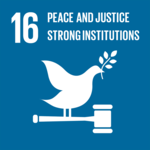
"Promote peaceful and inclusive societies for sustainable development, provide access to justice for all and build effective, accountable and inclusive institutions at all levels"
Peace and stability are requirements for sustainable development. A secure environment and institutions that act in line with the rule of law are essential for this. Corruption in the public sector in particular can endanger peace, economic development as well as the stability of societies and the rule of law. This is why SDG 16 promotes the establishment of effective, responsible and transparent institutions on all levels. General political conditions are created to enable successful social, ecological and market-oriented development.
Goal 17: Partnerships for the goals
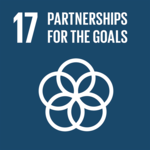
"Strengthen the means of implementation and revitalise the global partnership for sustainable development"
In order to surmount the problems of the present and achieve the SDGs, all nations must co-operate. This global partnership is the requirement to achieve the defined goals and create sustainable conditions – locally, regionally, nationally and globally. The worldwide partnership features mutual respect, shared values and the bundled efforts of all those involved. The guideline is the principle of "leave no one behind". It aims to focus on the needs of the poorest and disadvantaged and enable social, political and economic inclusion as well as equal opportunity for all people. Inclusive societies and an equitable world order are the requirements for sustained peace and thus sustainable development. This is to be achieved with SDG 17.



